Published: Jan. 12, 2025
Last Updated: Jan. 12, 2025

Cybercrime cases in Dubai present several specific legal issues, owing to the quick pace of technical improvements and the difficulties in resolving offences involving digital platforms. These cases frequently require courts to manage concerns of jurisdiction, digital evidence collection and preservation, and the ever-changing nature of cyber-related offences. Moreover, the anonymity provided by the internet makes it difficult to trace perpetrators, while the broad scope of cyber crimes, from hacking to data theft, can complicate investigations and prosecutions. As technology continues to evolve, so too must the legal frameworks designed to address these offences, ensuring that law enforcement and the judiciary can respond effectively to cybercrime threats.
One of the most critical obstacles in combating cybercrime is the technical aspect of evidence collecting and verification. Cybercrime investigations are highly reliant on digital traces, encrypted communications, and sophisticated forensic techniques. Ensuring the accuracy and validity of this evidence in court typically needs specialist knowledge, posing challenges for both law enforcement and legal practitioners.
Jurisdictional disagreements hamper the resolution of cybercrime cases. Many cybercrimes include criminals operating across borders, necessitating global cooperation. Dubai's authorities frequently face difficulties in traversing multiple legal systems and adhering to international accords such as extradition agreements and data-sharing protocols.
Another layer of complication emerges from the quick speed of technological advancement. Laws enacted to combat present risks may swiftly become obsolete as new cybercrime strategies develop. Crimes involving cryptocurrency, deepfake technology, and artificial intelligence are just a few examples of areas where legislative clarification is desperately needed.
The balance of privacy and security adds another layer to the legal landscape. While investigating cybercrime, law enforcement must gain access to sensitive data and communications, raising privacy concerns. Adhering to legal and ethical norms when conducting such investigations can be a delicate and difficult task.
Furthermore, the UAE imposes severe punishments for cybercrime, including fines, imprisonment, and deportation of expats. While these measures provide a powerful deterrent, executing them can be challenging when attackers use sophisticated anonymity technologies or operate from outside the UAE.
Corporate liability is often a major concern in cybercrime instances. Companies involved in cybercrime must demonstrate that they follow cybersecurity standards and regulations to avoid charges of negligence. The growing reliance on digital systems and data management has made it critical for organizations to invest in strong security measures to reduce their exposure to legal threats.
Public awareness and education are critical in preventing cybercrime. Many individuals and corporations are uninformed of the full scope of cyber regulations, resulting in inadvertent breaches. A concentrated effort to raise awareness and give training can aid in risk mitigation and the development of a compliance culture.
To summarize, the legal complexity surrounding cybercrime prosecutions under Dubai's Criminal Code mirrors the numerous challenges of the digital era. Addressing these issues involves a combination of legislation revisions, international coordination, and proactive efforts taken by individuals and groups. With Dubai's dedication to creating a secure digital environment, the continuous improvement of its legislative framework will be critical in protecting against cyber attacks


